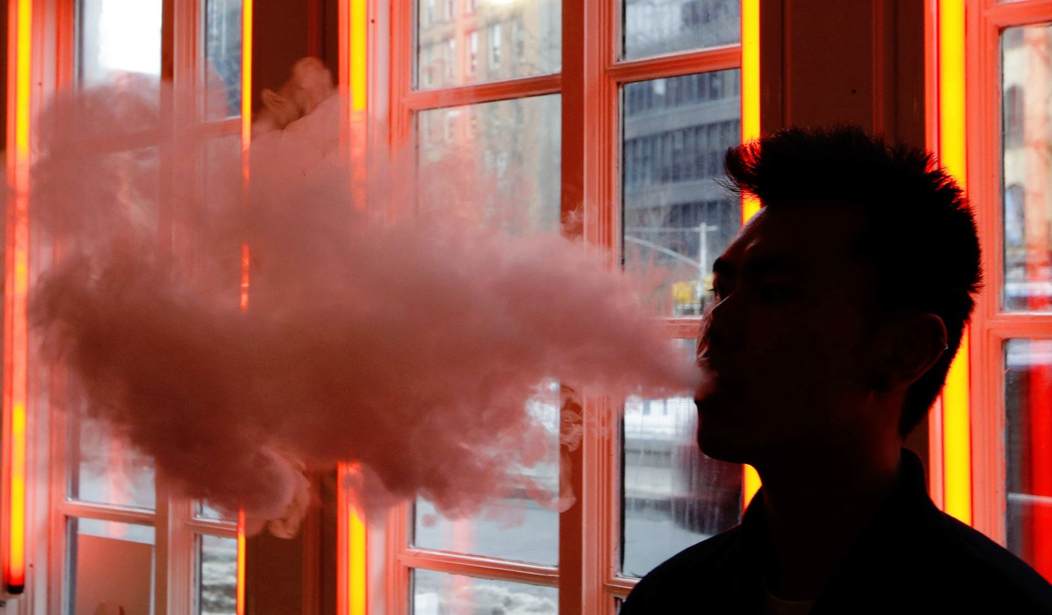There was a time when vaping - the practice of using a small, electronic device to inhale vapor - was thought to be the public health miracle of the half-century. While not quite up there with the polio vaccine or the still elusive cure for cancer, it proved a successful substitute for cigarette smokers among whom more traditional cessation therapies had failed.
Now, for reasons that are not entirely clear, the anti-smoking bureaucrats embedded within the U.S. Food and Drug Administration (who seem to think they have a say over anything people inhale) and the corporate entities known collectively as "Big Tobacco" are making common cause on efforts to crush the emerging vaping industry.
The complaints being lodged - that vaping liquids are offer in flavors attractive to children, that vaping devices are too easy for minors to obtain, and that vaping is unhealthy in and of itself - are of the kind the denizens of the Nannystate are fond of making. They say things like that all the time about consumer products they have in their sights.
What they're not saying is that vaping - which, like cigarettes, can be a nicotine delivery system - is perhaps a hundred times safer than traditional smoking. It literally saves lives, as a new study funded by Cancer Research UK demonstrates.
Loren Kock, a Ph.D. research in the Department of Epidemiology and Public Health at University College London, observes that "E-cigarettes have the potential either to decrease or increase health inequalities depending on levels of smoking cessation." The study he directed, published in mid-October in Addiction, is the first to look at the link between socioeconomic status and vaping devices.
What they found, Kock said, was from 2014 to 2016 e-cigarette use among smokers was generally higher among those from more affluent socioeconomic groups, while those from so-called disadvantaged groups were around half as likely to use one. By 2017, however, as products became both cheaper and more readily available, the gap disappeared.
Recommended
Interestingly, the research uncovered different patterns among long-term ex-smokers, with those from "socioeconomically disadvantaged groups" at least twice as likely to be using e-cigarettes and other devices as smoking cessation aides. Those from upper-income cohorts, one may presume, have other alternatives available to them like hypnotherapy and directed action under a doctor's care made possible by their having greater discretion in how their income is allocated.
The study has lessons for us here in the United States, chiefly that making vaping more expensive and making the materials harder to obtain may lead to an increase in smoking-related illness and death. If those on the lower end of the economic spectrum are, as the UCL study indicates, more reliant on vaping devices to stop smoking then more of them will contract lung cancer and other illnesses linked to cigarette smoking. And, being from the lower economic cohorts, expense related to their care are more likely to be borne by the taxpayer - since their healthcare is more likely to be provided to this group through Medicare and Medicaid.
It all may seem like circular logic. Some politicians want to tax vaping as cigarettes are taxed, banking on the revenue it will generate to fund all kinds of programs. Others want to destroy it before it becomes ubiquitous because they imagine it to be a health risk, never mind that the health risks connected to cigarette smoking are much greater and more expensive. And some want to regulate this emerging industry because that's just what they do - sort of like the guy who worked for the EPA in the original Ghostbusters.
Cancer Research UK Policy Manager George Butterworth said of the study that "The evidence so far shows that e-cigarettes are far less harmful than tobacco and can be effective in helping people to stop smoking."
He's right - and the government should be doing everything it can to help this new technology take root and save lives rather than trying to put it back on the shelf to gather dust.

























Join the conversation as a VIP Member